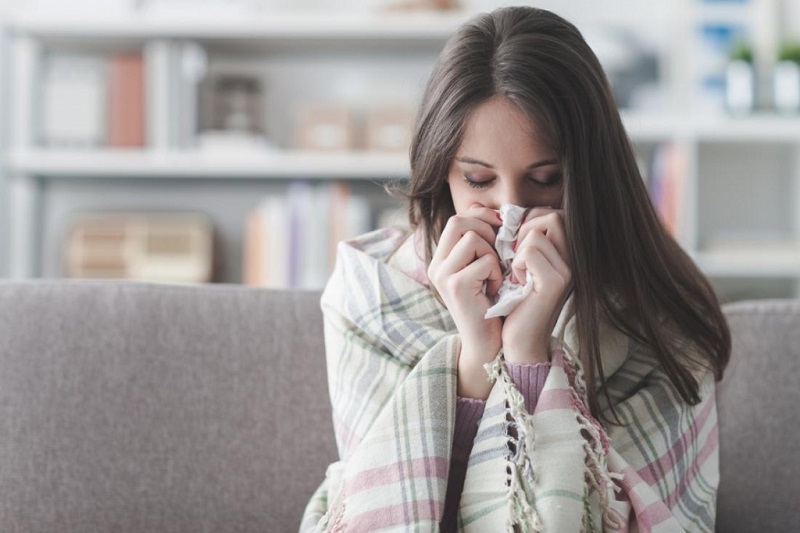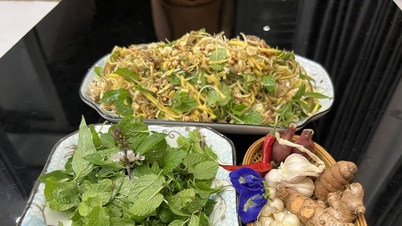GĐXH - Normally, people with the flu will recover within 3-7 days. However, the disease can last longer in patients with weak immunity or underlying diseases, and can even cause complications if treated incorrectly.
Currently, the weather in the North changes erratically, hot days, cold nights combined with dry weather are favorable conditions for disease-causing bacteria and viruses to develop.
Some typical diseases during this time are: Dengue fever, hand, foot and mouth disease, atopic dermatitis, measles, Japanese encephalitis, respiratory diseases such as flu, colds, asthma, pneumonia...

Flu is a common disease during the fall and winter seasons. Illustration photo.
In particular, flu is an acute viral respiratory infection that is very common during the transitional period of autumn and winter. Symptoms of the disease include: fever, headache, muscle aches, fatigue, runny nose, sore throat and cough. Cough symptoms are often severe and prolonged. May be accompanied by gastrointestinal symptoms such as nausea, vomiting, diarrhea, especially in children.
Usually, the patient will recover within 3-7 days. However, the disease may last longer if the patient has a weak immune system or an underlying disease.
The most common complications of the flu are pneumonia, meningitis, and bacterial superinfection. More seriously, the flu can cause respiratory failure, which is especially dangerous for people with chronic diseases such as asthma, chronic obstructive pulmonary disease, cardiovascular disease, diabetes, etc.
In addition, pregnant women, infants and children under 5 years old are also at risk of complications when having the flu.
What to do when you have the flu?
According to doctors at the 108 Military Central Hospital, when having the flu, the patient needs to isolate himself from people who are not sick living in the family as much as possible, at least 5 days after the onset of symptoms. This will limit the risk of transmitting the flu to relatives, especially those with weak resistance and susceptible to the flu such as the elderly, children, and people with unstable health.
In addition, patients should stay at home in isolation to avoid spreading the flu to others. In case they have to leave the house, they should wear a medical mask and cover their mouth and nose when coughing or sneezing, and use a tissue to prevent respiratory secretions to avoid the risk of spreading the flu to others.
Every day, people with flu should use antiseptic nose drops and drink 1 cup of minced garlic mixed with warm water; need to eat liquid, hot, easy-to-digest foods, drink lots of water (ORS, fresh fruit juice, cold porridge, warm fresh lemon juice mixed with honey...), especially for the elderly and children.
Patients can steam at home with leaves such as lemon leaves, grapefruit leaves, perilla leaves, Vietnamese balm, mint, lemongrass leaves, basil, etc. to clear the nose, relieve colds, sweat out toxins and create a comfortable, relaxing feeling for the patient's body.
If flu symptoms last more than a week, the patient has a high fever that lasts for a long time, is not relieved by using common fever-reducing drugs, has a lot of cough, chest tightness, difficulty breathing, aches and pains, and increased fatigue, the patient should be taken to a medical facility for timely monitoring and treatment.
Things to avoid when you have the flu
According to doctors at the 108 Central Military Hospital, flu patients need to rest and relax in well-ventilated places, avoid wind, avoid temperatures that are too high or too low, and should not lie in air-conditioned rooms because it will make the flu difficult to improve and make symptoms of dry throat and hoarseness worse.
In addition, when you have a cold, you should limit processed foods that are high in fat. Because processed foods are not safe and hygienic, the nutrients in these foods are also reduced during processing. This is not good for the patient's recovery process.

People with flu should limit alcohol, beer and stimulants to avoid making the disease worse. Illustration photo.
In addition, alcohol and carbonated drinks are foods that should be avoided when having the flu. The reason is that these drinks not only make the body more susceptible to dehydration but also weaken the immune system, making it take longer for people with the flu to recover.
On the other hand, coffee, cigarettes and other stimulant products should also be avoided when you have the flu because they will make coughs and sore throats worse.
It is especially important not to use antibiotics when you have the flu because the flu is caused by a virus and cannot be cured with antibiotics. Antibiotics are used to treat bacterial infections, such as sinusitis, sore throats, ear infections, skin and urinary tract infections.
Using antibiotics when they are not needed increases the risk of developing antibiotic resistance in the long term. In fact, in many cases, taking antibiotics to treat a cold can make you sicker or make your illness last longer.
How to prevent flu
To prevent flu during the changing seasons, experts recommend that people gargle with warm salt water or specialized mouthwash that can relieve sore throats.
Make it a habit to wash your hands regularly with soap or antibacterial gel, use tissues to cover your mouth and nose when coughing or sneezing, and throw away all tissues after use.
In addition, it is necessary to have a scientific nutritional regimen to enhance the body's natural resistance, fight the flu in many ways: Drink lots of water, eat lots of vegetables and fruits rich in vitamin C such as guava, orange, strawberry, kiwi, papaya, cauliflower... Exercise regularly.
In addition, flu vaccination, especially for children, is also an effective method to help prevent flu in the current context of increasing respiratory diseases.
Note for caregivers of patients with flu:
- Wear a mask when in contact with people with flu, use antiseptic nasal drops, and wash hands frequently after and before contact with patients with antibacterial hand sanitizer.
- Pay attention to providing additional nutrients to ensure health when caring for people with flu. You should eat more spices that warm the body and have antibacterial properties (such as onions, garlic, ginger, etc.), eat lots of fresh fruits and vegetables rich in vitamin C (lemon, orange, tangerine, etc.) to increase resistance against bacteria that cause flu.
- Daily utensils of people with flu (such as bowls, chopsticks, spoons, cups, bowls, etc.) should be boiled. It is best to use them separately. Do not hold dirty clothes of sick people.
- Absolutely do not eat leftover food from people with flu.
- Used tissues from flu patients should be kept in a bag and disposed of with other waste.
- When you see signs of flu such as: runny nose, headache, body aches, red eyes, chills, you must isolate and get examined and treated immediately.
Source: https://giadinh.suckhoedoisong.vn/bi-cam-cum-khi-giao-mua-dung-lam-nhung-dieu-nay-neu-khong-muon-benh-nang-them-172241121153942803.htm


![[Photo] President Luong Cuong receives President of the Cuban National Assembly Esteban Lazo Hernandez](https://vphoto.vietnam.vn/thumb/1200x675/vietnam/resource/IMAGE/2025/9/30/4d38932911c24f6ea1936252bd5427fa)

![[Photo] Solemn opening of the 12th Military Party Congress for the 2025-2030 term](https://vphoto.vietnam.vn/thumb/1200x675/vietnam/resource/IMAGE/2025/9/30/2cd383b3130d41a1a4b5ace0d5eb989d)

![[Photo] Panorama of the cable-stayed bridge, the final bottleneck of the Ben Luc-Long Thanh expressway](https://vphoto.vietnam.vn/thumb/1200x675/vietnam/resource/IMAGE/2025/9/30/391fdf21025541d6b2f092e49a17243f)
![[Photo] The 1st Congress of Phu Tho Provincial Party Committee, term 2025-2030](https://vphoto.vietnam.vn/thumb/1200x675/vietnam/resource/IMAGE/2025/9/30/1507da06216649bba8a1ce6251816820)




























![[Photo] General Secretary To Lam, Secretary of the Central Military Commission attends the 12th Party Congress of the Army](https://vphoto.vietnam.vn/thumb/1200x675/vietnam/resource/IMAGE/2025/9/30/9b63aaa37ddb472ead84e3870a8ae825)































































Comment (0)